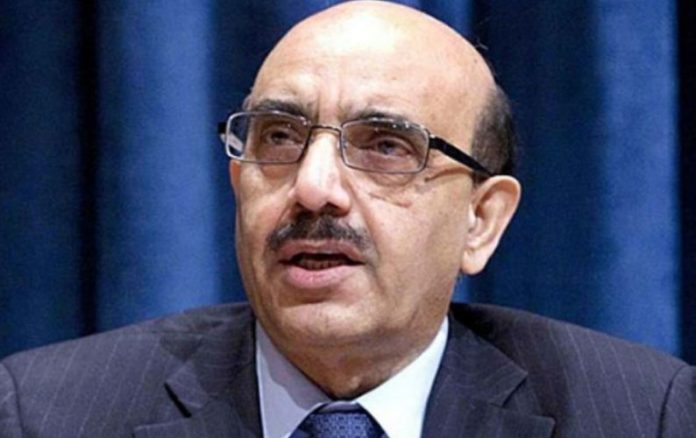ISLAMABAD, Sep 26 (APP):Sardar Masood Khan, former President of Azad Jammu and Kashmir and Pakistan’s former Ambassador to the United States, China, and the United Nations, described Prime Minister Shahbaz Sharif and Field Marshal Asim Munir’s recent meeting with US President Donald Trump as a new “strategic moment” in the trajectory of Pakistan–U.S relations.In a press statement on Friday, Ambassador Khan highlighted that while optics of the meeting were encouraging, the substance lay in the new frameworks of cooperation on peace, security, and economic transformation.
He underlined that Pakistan has been assigned a central role in regional peace efforts, particularly in the Middle East. “Pakistan and Saudi Arabia’s unity has been pivotal in persuading President Trump and his team to avoid escalation in Gaza and to work instead toward a sustainable solution for Palestine. The roadmap presented by US Special Representative Steve Witkoff is evidence that our diplomacy is being recognized,” he said.
On bilateral matters, Ambassador Khan noted that the meeting produced significant economic breakthroughs. The US reduced tariffs on Pakistani exports to the lowest in the region, unlocking major opportunities in Pakistan’s largest trading market. Agreements were advanced on critical minerals, renewable energy, cryptocurrency, and oil exploration.
“This is good news for Pakistan’s economy. The challenge is how we, as a nation, can translate these opportunities into tangible growth and jobs,” he added.
Ambassador Khan emphasized the revival of intelligence-to-intelligence cooperation, recalling Pakistan’s past collaboration with US agencies during the fight against terrorism. He said the renewed focus will address threats emanating from Afghanistan, Daesh, and the Tehreek-e-Taliban Pakistan (TTP), while also spotlighting India’s extensive terror networks in the region.
“India has established operational and financial infrastructures targeting Pakistan. This reality must be shared with the United States, and both countries have now agreed to dismantle these threats together,” he asserted.
Reflecting on broader geopolitical dynamics, Masood Khan said Pakistan’s role is gaining recognition in Washington as independent and indispensable. “Senior US officials have clarified that Pakistan is not to be viewed through the prism of China or India.
Ours is a stand-alone relationship, with strategic weight in South Asia, Central Asia, and Western Asia. India, by contrast, has been increasingly isolated—unable to deliver on expectations as a counterweight to China,” he observed.
He welcomed recent US investments in critical minerals—antimony, lithium, nickel, copper, and rare earths—valued at trillions of dollars, describing them as vital for global industries from smartphones, electric vehicles to defence technology and alternate energy.
“Pakistan holds trillions of dollars in untapped reserves. This partnership anchors our relations in a solid economic foundation,” he noted.
In this context, he noted a $50 million Memorandum of Understanding (MOU) has been signed between United States Strategic metals and Frontier Work Organization (FWO), on extraction of critical minerals in Pakistan.
Ambassador Khan further called for people-to-people linkages, academic exchanges, and technology partnerships to complement security and economic ties. He emphasized that unlike in the past, when Pakistan was drawn into foreign wars, the current agenda is focused on trade, technology, and peace.
He commended leadership of the two countries for positioning the country as a bridge between regions and powers. “Pakistan is no longer a peripheral player. It is at the heart of regional diplomacy, economic transformation, and global security cooperation. By leveraging this momentum with clarity and consistency, Pakistan can redefine its future,” he stated

















